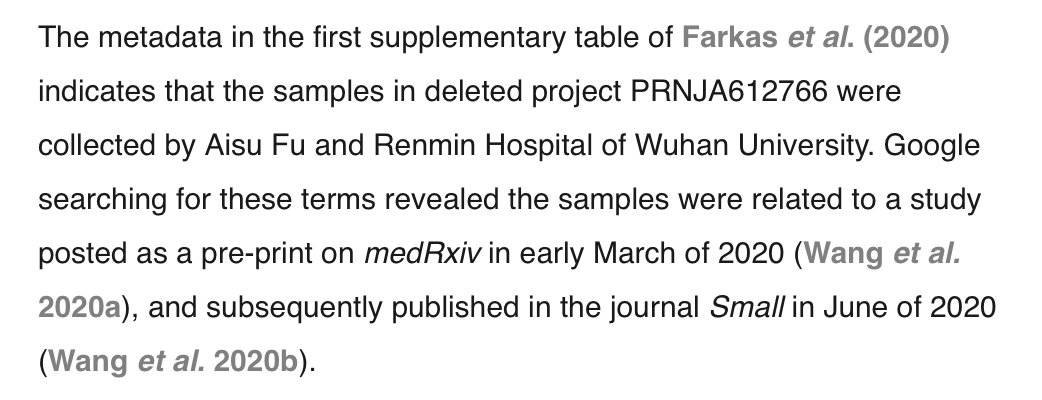
I want to help people understand exactly what happened with these early Covid-19 sequences that were wiped off US-based and even China-based databases.
This was described in @jbloom_lab's recent preprint, which he updated with an actual email exchange between the authors & NCBI.
This was described in @jbloom_lab's recent preprint, which he updated with an actual email exchange between the authors & NCBI.
@jbloom_lab This is the original preprint processed by bioRxiv on 4 March 2020:
medrxiv.org/content/10.110…
This is the paper published on 24 June 2020:
onlinelibrary.wiley.com/doi/full/10.10…
medrxiv.org/content/10.110…
This is the paper published on 24 June 2020:
onlinelibrary.wiley.com/doi/full/10.10…
Neither one mentions the data that the authors had submitted to NCBI, a US-based public database that anyone can access internationally without a login or being IP-tracked.
So how in the world did Dr Bloom find the data?
This is honestly quite an indirect path and I don't think I would've been able to trace it.
This is honestly quite an indirect path and I don't think I would've been able to trace it.

But Bloom persisted and managed to salvage the data from Google Cloud...
"After I e-mailed the NIH the original version of this manuscript, they sent me the e-mails requesting deletion of the data"
biorxiv.org/content/10.110…
"After I e-mailed the NIH the original version of this manuscript, they sent me the e-mails requesting deletion of the data"
biorxiv.org/content/10.110…
In mid June, just before the paper was published, presumably it had been accepted... the authors asked the database to wipe it. 

I know some very strange scientists are saying this **** is normal. No, it's not. I challenge you to find another email from authors asking NCBI to wipe their data just before their paper is published.
The paper by these authors even repeatedly uses sequences from the database that they asked their data to be wiped from. GenBank is mentioned 3x.
The authors understand how modern day scientific analysis works.
The authors understand how modern day scientific analysis works.
"sequences of SARS-related viruses available at GenBank were downloaded"
"complete and partial gene sequences available in GenBank through November 1, 2019, were downloaded"
"collected all complete and partial target gene sequences for these viruses available in GenBank"
"complete and partial gene sequences available in GenBank through November 1, 2019, were downloaded"
"collected all complete and partial target gene sequences for these viruses available in GenBank"
Please don't give me any BS that these scientists didn't understand the consequences of wiping their data off GenBank.
Bloom had done due diligence - checking all databases accessible to him and reaching out to the authors for comment. Journalists also reached out to the authors.
No response.
No explanation for why they would wipe early Covid-19 data off databases where it would be visible.
No response.
No explanation for why they would wipe early Covid-19 data off databases where it would be visible.

And @TheSeeker268 joined in and searched for the sequences in Chinese databases... they had also been deleted around the same time.
https://twitter.com/TheSeeker268/status/1407519481128128513
Contrary to what the authors told NCBI - that they had uploaded an updated version to another website (which one!?) - their data had been deleted off not only the international US-based database, but also the China-based database.
I would like to see all the emails that have been sent to NCBI since September 2019 asking for changes in the embargo and modification/deletion of data.
• • •
Missing some Tweet in this thread? You can try to
force a refresh



